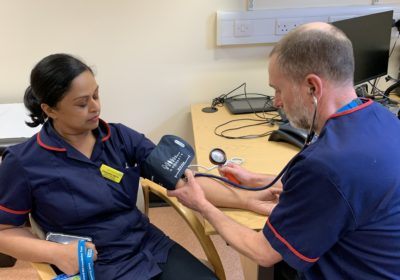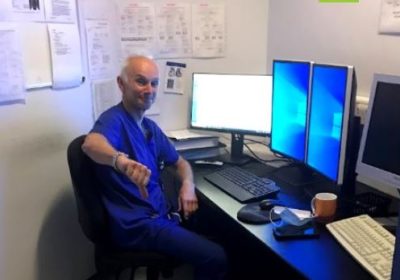An independent review looked at alleged failures of patient safety and governance at NEAS following a whistle-blowing allegation published by the Sunday Times in May 2022.
The whistle-blower claimed NEAS covered up fatal paramedic errors and deliberately altered or omitted important facts that families and the relevant coroners had a right to know and alleged they were bullied and victimised for raising these concerns.
Former Health Secretary Sajid Javid announced the review, which was led by retired NHS leader Dame Marianne Griffiths, former Chief Executive of University Hospitals Sussex NHS Foundation Trust, in June last year.
The investigation team spoke to four of the families named in the newspaper report, regarding incidents between December 2018 and December 2019.
They include a 17-year-old girl from Shildon, County Durham, who was found hanging in woodland near her home in December 2018 but was declared dead at the scene without any CPR being attempted by the first paramedic on scene.
The review report said that the paramedic, who has since been struck off, ignored national and local guidelines by not attempting advanced life support techniques. It said: “However small the probability of recovery was, (she) deserved that chance and so did her family.”
Another case covered by the review team involved the death of a 62-year-old man from Dormanstown near Redcar with COPD who urgently needed oxygen in March 2019 after a power cut switched off his oxygen supply. The crew allocated was hampered by the same power cut, which locked the gates at the nearby ambulance station, and they did not know how to use the manual override so were unable to depart for the three minute journey.
A second ambulance crew was allocated to the case but this crew was delayed due to refuelling on route to the property and being initially unable to find the key safe to access the patient’s property. By the time the key was finally found and the crew were able to access the property the man had died.
The report found staff had not been trained in how to manually override the station gates, that the second ambulance had nearly half a tank of fuel so could have arrived without stopping and saved almost five minutes, and that the delay in finding the key safe and accessing the property was almost 12 minutes. The arrival time was over 36 minutes.
The incident was deemed to be ‘low harm’ as the ambulance arrived within the National Standard for a Category 2 incident (90% of patients to have received a response within 40 minutes) and consequently the family and coroner were not informed of the delay issues.
The review report said: “The investigation team spoke to four of the families that were named in the report and there is no doubt that their concerns expressed about openness and candour are justified. In addition, for most of these cases, the management of their concerns and complaints were poorly handled.”
But the review fell short of agreeing with the families’ belief that changes to reports and not sending original documentation to coroners was done deliberately “to avoid negative attention and accountability”.
It concluded: “We cannot say what the intent was of those individuals who authorised those changes or did not share information as we were not there. We have not agreed with some of those decisions taken or some of those judgments made and believe that there are significant learning opportunities to be gained in the organisation in using these cases as a vehicle for improvement.”
North East Ambulance Service has responded to the review, which has made a series of recommendations The full report can be found here: https://www.england.nhs.uk/north-east-yorkshire/our-work/publications/ind-investigation-reports/
 Helen Ray, Chief Executive of NEAS, (pictured) said: “Firstly, I would like to say how sorry I am for any distress caused to the families for mistakes made in the past. Each family has received an unreserved apology from me of behalf of the trust.
Helen Ray, Chief Executive of NEAS, (pictured) said: “Firstly, I would like to say how sorry I am for any distress caused to the families for mistakes made in the past. Each family has received an unreserved apology from me of behalf of the trust.
“There were flaws in our processes and these have now either been addressed or are being resolved at pace. We are grateful the report recognises that we have a new leadership team committed to addressing the issues.
“Of the 15 recommendations directly applicable to the trust, all are being actioned at pace and in some cases already completed.
“We have strengthened the governance, systems and processes relating to investigations and coronial reports; and continue to monitor these to ensure the lessons have been learned. We have made it easier for issues to be flagged by increasing our resources for our Freedom To Speak Up team.
“The review recognises the need for more financial support for NEAS, which is particularly welcome. Over the past two years the ambulance service and the NHS has faced unprecedented pressures, the likes of which we’ve never experienced.
“Critical to our success is clear investment in our Trust. We are now beginning to see the results of the additional help we received last year in recruiting 58 extra paramedics and 106 call handlers over the last two years.
“The action we have taken is also recognised by the Care Quality Commission, who last week said we have begun to make the improvements that address their concerns.
“However, there is more to do so the public can receive the best possible care. We are working closely with our commissioners and partners to ensure that this will happen.”
An assurance statement by NEAS in response to the review can be read here.
Chief Executive Helen Ray has also recorded a video message apologising for the failings:
The North East Ambulance Service NHS Foundation Trust provides urgent and emergency care and patient transport across the North East of England, covering a population of 2.7m people over 3,200 square miles. NEAS employs more than 3,000 staff working out of 51 ambulance stations across Northumberland, Tyne & Wear, County Durham and Darlington and Teesside. The service answers more than 1.5m 999 and NHS111 calls and provides out-of-hospital care and treatment as well as emergency preparedness, resilience and response planning.
An inspection by the Care Quality Commission in 2022 rated NEAS overall as “requires improvement” but evidence of improvement was found during a follow-up inspection in late April and early May 2023. The overall rating for emergency and urgent care has improved from inadequate to requires improvement. Being safe and well-led have also gone up from inadequate to requires improvement. Effective and responsive were not included in this inspection and remain rated requires improvement. Caring was also not inspected and remains rated as good.
As this was a focused inspection, the overall trust ratings were not re-rated. Therefore, the trust remains rated requires improvement overall and for being safe and effective. Well-led remains rated inadequate, and caring and responsive remain rated as good. Full article below:






